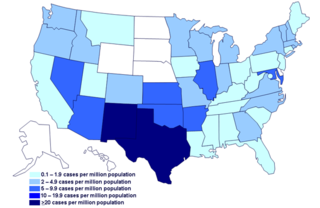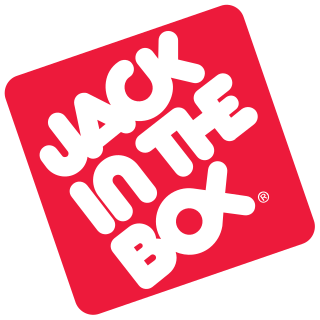
Escherichia coli O157:H7 is a serotype of the bacterial species Escherichia coli and is one of the Shiga-like toxin–producing types of E. coli. It is a cause of disease, typically foodborne illness, through consumption of contaminated and raw food, including raw milk and undercooked ground beef. Infection with this type of pathogenic bacteria may lead to hemorrhagic diarrhea, and to kidney failure; these have been reported to cause the deaths of children younger than five years of age, of elderly patients, and of patients whose immune systems are otherwise compromised.

Foodborne illness is any illness resulting from the contamination of food by pathogenic bacteria, viruses, or parasites, as well as prions, and toxins such as aflatoxins in peanuts, poisonous mushrooms, and various species of beans that have not been boiled for at least 10 minutes.
PulseNet is a network run by the Centers for Disease Control and Prevention (CDC) which brings together public health and food regulatory agency laboratories around the United States. Through the network, cooperating groups can share pulsed field gel electrophoresis (PFGE) results which act as fingerprints to distinguish strains of organisms such as E. coli, Salmonella, Shigella, Listeria, Campylobacter, Vibrio cholerae, Vibrio parahaemolyticus and Yersinia pestis. In this way, efforts to combat infectious disease outbreaks are strengthened. Specifically, by sharing results, it is easier to identify large-scale outbreaks. For example, if an outbreak of E. coli occurred in two distant parts of the country, PulseNet might help prove a link between the two. In such a case, the pathogen would have the same genetic fingerprint at both locations.
Topps Meat Company was a privately owned family company founded in 1940 by Benjamin Sachs in Manhattan, New York. The company later relocated to Elizabeth, New Jersey. The company produced and distributed frozen ground beef patties and other meat products processed at its 3,000-square-foot (280 m2) plant in Elizabeth and posted about $8.8 million a year in sales, according to information reported by Dun & Bradstreet. In 2003, the company was purchased by Strategic Investment and Holdings, an investment firm based in Buffalo, New York and by 2007 it was "one of the country’s largest manufacturers of frozen hamburgers." In 2007 the company ceased operations following Escherichia coli O157:H7 contamination of products and the ensuing recall.

The 2008 United States salmonellosis outbreak was an outbreak of salmonellosis across multiple U.S. states due to Salmonella enterica serovar Saintpaul. Over the course of the outbreak, 1442 cases were identified across 43 U.S. states, the District of Columbia, and Canada. The U.S. Centers for Disease Control and Prevention (CDC) investigation determined that jalapeño peppers imported from Mexico as well as Serrano peppers were major sources of the outbreak. Tomatoes may have been a source as well. The outbreak lasted from April to August 2008.

The 2008 Canadian listeriosis outbreak was a widespread outbreak of listeriosis in Canada linked to cold cuts from a Maple Leaf Foods plant in Toronto, Ontario. There were 57 total confirmed cases, resulting in 23 deaths.

William "Bill" Marler is an American personal injury lawyer and food safety advocate. He is the managing partner of Marler Clark, a law firm based in Seattle, Washington which specializes in foodborne illness cases.

Peanut Corporation of America (PCA) was a peanut-processing business which is now defunct as a result of one of the most massive and lethal food-borne contamination events in U.S. history.

Michael R. Taylor is an American lawyer who has played leadership roles in the US Food and Drug Administration, agrochemical company Monsanto, and law firm King & Spalding. He currently co-chairs the board of STOP Foodborne Illness, a non-profit that supports victims of serious illness and their families in efforts to strengthen food safety culture and practices in government and industry.

A novel strain of Escherichia coli O104:H4 bacteria caused a serious outbreak of foodborne illness focused in northern Germany in May through June 2011. The illness was characterized by bloody diarrhea, with a high frequency of serious complications, including hemolytic–uremic syndrome (HUS), a condition that requires urgent treatment. The outbreak was originally thought to have been caused by an enterohemorrhagic (EHEC) strain of E. coli, but it was later shown to have been caused by an enteroaggregative E. coli (EAEC) strain that had acquired the genes to produce Shiga toxins, present in organic fenugreek sprouts.
Escherichia coli O104:H4 is an enteroaggregative Escherichia coli strain of the bacterium Escherichia coli, and the cause of the 2011 Escherichia coli O104:H4 outbreak. The "O" in the serological classification identifies the cell wall lipopolysaccharide antigen, and the "H" identifies the flagella antigen.
The 1996 Odwalla E. coli outbreak began on October 7, 1996, when American food company Odwalla produced a batch of unpasteurized apple juice using blemished fruit contaminated with the E. coli bacterium, which ultimately killed a 16-month-old girl and sickened 70 people in California, Colorado, Washington state, and British Columbia, of whom 25 were hospitalized and 14 developed hemolytic uremic syndrome. Odwalla made and marketed unpasteurized fruit juices for the health segment of the juice market.
In 2006, there were several outbreaks of foodborne illness from spinach and lettuce contaminated by E. coli O157:H7.

The 1992–1993 Jack in the Box E. coli outbreak occurred when the Escherichia coli O157:H7 bacterium killed four children and infected 732 people across four US states. The outbreak involved 73 Jack in the Box restaurants in California, Idaho, Washington, and Nevada, and has been described as "far and away the most infamous food poison outbreak in contemporary history." The majority of the affected were under 10 years old. Four children died and 178 others were left with permanent injury including kidney and brain damage.
Food Safety News (FSN) is an online news publication focusing on food safety. It was founded in 2009 by Bill Marler, a lawyer and food safety advocate. Marler is the Managing Partner of Marler Clark, a Seattle, Washington, law firm that specializes in foodborne illness cases. He said that Food Safety News was created to "fill a void" left by print and broadcast media as budgetary constraints led to "dedicated reporters on the food, health and safety beats... being reassigned or seeing their positions disappear altogether." The site provides daily news coverage of foodborne illness outbreaks and investigations, food recalls, food technology innovations, and victim profiles.

The 2018 American salmonella outbreak was an American foodborne disaster that started in Iowa, spreading to 7 other states, sickening as many as 265 people, killing one, with 94 hospitalized. Ready-to-eat chicken salad was produced by Iowa-based Triple T Specialty Meats Inc. between January 2 and February 7 for distribution in Fareway grocery stores. Salad was sold in containers of various weights at Fareway stores deli from January 4 to February 9. Total of approximately 20 630 pounds of chicken were deemed contaminated with Salmonella Typhimurium at the time of recall on February 21.

Food safety in the United States relates to the processing, packaging, and storage of food in a way that prevents food-borne illness within the United States. The beginning of regulation on food safety in the United States started in the early 1900s, when several outbreaks sparked the need for litigation managing food in the food industry. Over the next few decades, the United States created several government agencies in an effort to better understand contaminants in food and to regulate these impurities. Many laws regarding food safety in the United States have been created and amended since the beginning of the 1900s. Food makers and their products are inspected and regulated by the Food and Drug Administration and the Department of Agriculture.

Milk borne diseases are any diseases caused by consumption of milk or dairy products infected or contaminated by pathogens. Milk borne diseases are one of the recurrent foodborne illnesses—between 1993 and 2012 over 120 outbreaks related to raw milk were recorded in the US with approximately 1,900 illnesses and 140 hospitalisations. With rich nutrients essential for growth and development such as proteins, lipids, carbohydrates, and vitamins in milk, pathogenic microorganisms are well nourished and are capable of rapid cell division and extensive population growth in this favourable environment. Common pathogens include bacteria, viruses, fungi, and parasites and among them, bacterial infection is the leading cause of milk borne diseases.












